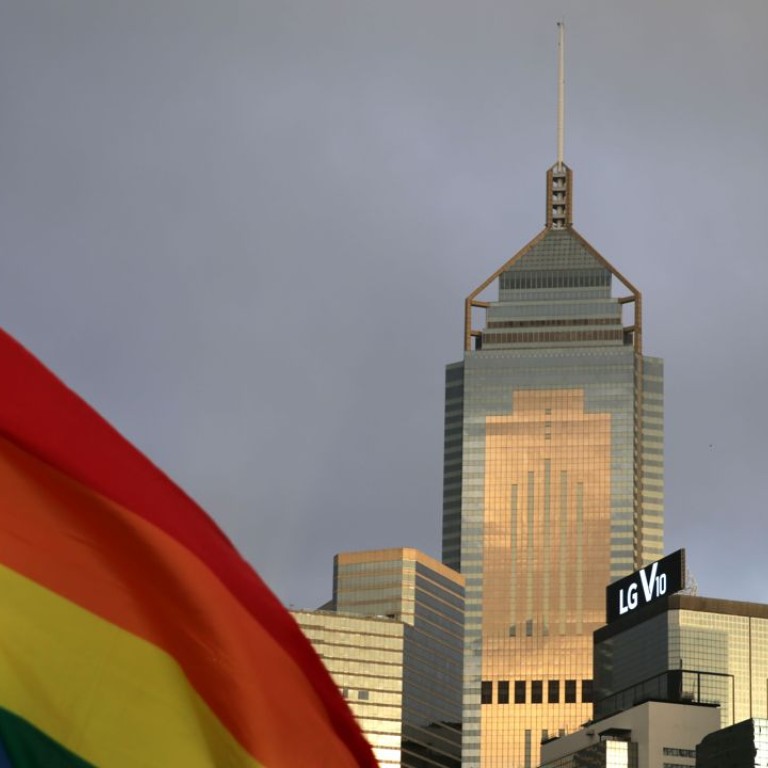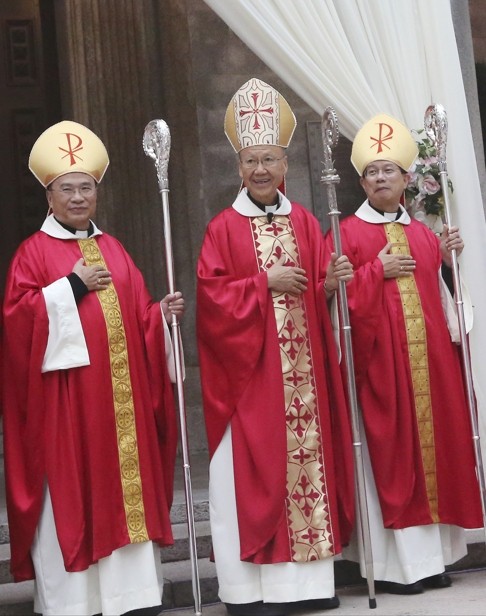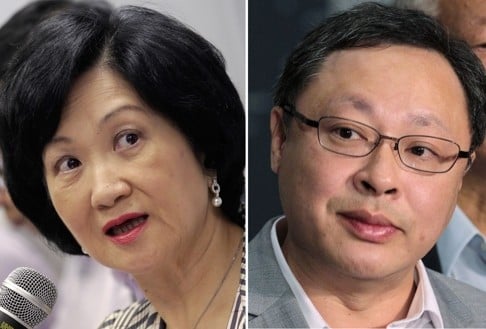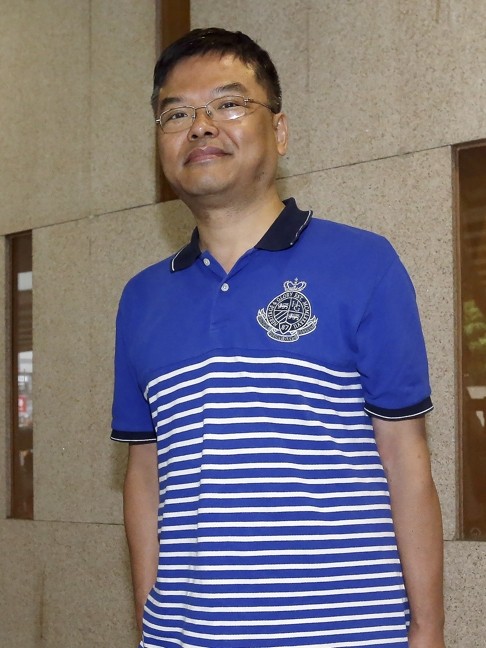
Hong Kong Catholics split over church’s stance on gays ahead of district polls
Sexual minorities feel let down by church’s call to consider candidates’ views on same-sex relationships when they vote on Sunday
Cardinal John Tong Hon raised the stakes for gay rights activists on November 5 when he called on Hong Kong’s Catholics – who make up 5 per cent of the population – to consider candidates’ views on homosexuality when they vote in this coming Sunday’s district council elections.
“Extreme libertarian attitudes, individualism, the ‘sex liberation movement’ and the ‘gay movement’” were advocating the enactment of a Sexual Orientation Discrimination Ordinance (Sodo) and the recognition of same-sex marriages, he wrote.
Hong Kong was in a “critical situation” that could “force our society into undergoing a change that would turn it upside-down”, he said with apocalyptic drama. A Christian student group that organised a workshop on lovemaking techniques at the Chinese University of Hong Kong recently was yet another piece of evidence that the “propagation of sexual liberalisation” was rampant, and had to be stopped.
The Victorian language, the suggestion that gay rights and loose morals are the same thing, and the decision to make sexuality an issue in a grass-roots election came as a surprise to a lot of people.

Bernardette, a lesbian who is the contact person for Compassion, a Catholic mutual support group for sexual minorities, says the letter goaded her into making a stand at Pride. “Our group is about a year old and we intended to stay very low profile for fear of being attacked by mainstream churchgoers. But after seeing Cardinal Tong’s letter, we decided it’s no longer an option to stay quiet,” she says. She took part in the press conference held before the parade set off although she insisted – as she does for this interview – on withholding her real name.
Emmanuel, a gay man in his late 20s who has been a Catholic all his life and has a steady boyfriend, says he was disappointed by the letter. “I thought Pope Francis would make our church more liberal but it seems that change hasn’t reached the Hong Kong diocese,” he says.
Lawmaker Cyd Ho, a long-term supporter of gay rights, was quoted by Apple Daily as saying that Cardinal Tong is effectively steering the Church away from pro-democracy political parties. But it is not clear whether his directive will benefit either the pro-establishment or the pan-democratic camps. In Hong Kong, political liberalism and openness to sexuality and family values do not always overlap.
People are full of surprises. Pro-establishment politician Regina Ip Lau suk-yee supports Sodo but Benny Tai, the law professor behind the Occupy movement, is a Christian who has advised the church on how best to fight the propose legislation. Roger Wong Wai-ming, who fully backs his son Joshua’s political activism, is one of the most strident critics of gay rights in town.

Neither Tong nor Yeung were available to comment on the timing or the reason for issuing the election guidance. The church’s communication office passed SCMP.com to the Diocesan Committee for the Pastoral Care of Persons with Same-sex Attraction, whose executive secretary, Kevin Lai, explains that the letter is a necessary defence against an urgent and growing threat to church values.
“America has joined a growing list of countries that have introduced same-sex marriages after legislating against discrimination based on sexual orientation [in some states]. If Hong Kong allows Sodo to get through, it will be judged discriminatory to not let same-sex couples marry. That is counter to our belief that marriage is between a man and a woman but the church has been slow to act on the issue. By comparison, the LGBT lobby has better utilised education and mass media to change people’s culture,” he says.

The church and the LBGT community has had many clashes over the years, most dramatically in 2003, when members of Rainbow Action, a gay-rights group, stormed the Catholic cathedral in Caine Road, Mid-Levels, during mass to protest against the church’s objection to same-sex marriage. But the church has shown moments of tolerance, too. In 1982, the then head of the Catholic church in Hong Kong, Cardinal John Wu, lent his support to the decriminalisation of homosexual conduct between men while the Anglican church opposed it. More recently, Pope Francis was widely praised for his placatory comments.
“If a person is gay and seeks God and has good will, who am I to judge?” he said on a visit to Brazil in 2013. This year, he gave an audience in Washington to a gay former student and his boyfriend.
But the Hong Kong diocese is concerned that the government has not dropped Sodo from its agenda and that it could be sued under such a law for declaring that homosexuality is wrong.
The Catholic church has not changed its fundamental approach to homosexuality since the Second Vatican Council in the 1960s, a multiyear review of how the church remained relevant in modern society. Its view, shared with most traditional protestant churches today, is that being physically attracted to the same sex is not a sin in itself, but to act on your desire is. The church must not, under any circumstance, morally justify any sexual act that does not go towards procreation and that includes masturbation and contraception.
This don’t-spill-your-seed, utilitarian approach to sex has changed little from St. Paul’s days, when he told Roman men they must not leave “the natural use of the woman” and succumb to “vile affections” to burn “in their lust one toward another” (Romans 1:26-27).
The all-embracing Pope, who also sacked a gay priest last month and met with Kim Davis, the American clerk jailed for refusing to grant same-sex marriage licences, is not seeking to change the church’s catechism on sexuality, Lai says. However, the Pope wants the church to be compassionate to those who are struggling with their erroneous desires, he adds.
Emmanuel says he has never witnessed much compassion from the church. As a young teenager, he confessed to a church social worker and a priest that he was attracted to men and that caused his relationship with his parents to break down. “I thought being in a confession box would give me anonymity. Instead, the priest waited for me outside and insisted that I went to New Creation, a group that counsels people on how to stop being gay. Then, the social worker decided to share what I told her with my parents, who are both Catholic and were very shocked. For years, I avoided going home because the atmosphere was so bad,” he says.
That was over 10 years ago but the fact that both he and Bernadette refuse to have their real names published is an indication of the fear still faced by LGBT Catholics today.
I thought Pope Francis would make our church more liberal but it seems that change hasn’t reached the Hong Kong diocese
Emmanuel – a regular churchgoer who keeps his sexual orientation a secret from his Catholic friends -- decided to superimpose the rainbow flag on his Facebook profile picture when he heard about the US Supreme Court decision to legalise same-sex marriage in June. “I thought it would be OK since so many straight people were doing that, too. I received hundreds of messages from my Catholic friends saying they couldn’t see how I could put a rainbow flag up and call myself Catholic,” he says.
“To be told that loving someone of the same sex is wrong can be an unbearable psychological burden for believers. Our support group has seen members who contemplated suicide because they couldn’t resolve the conflict and they felt so alone,” says Bernardette.
There has been plenty of academic research on how Christianity and homosexuality can be reconciled, ranging from earlier works such as John Boswell’s seminal 1980 book Christianity, Social Tolerance, and Homosexuality and research conducted by Chou Wah-shan at the University of Hong Kong in the 1980s and 1990s. More recently in Hong Kong, a group of LGBT Christians have set up the Queer Theology Academy to promote the idea that religion is often a veneer for rank prejudice. It will be holding a fund-raising walkathon on November 21.
The Catholic church is not blind to the need to bring allow more views to be expressed within its churches, says Peter Ho, a Catholic pastoral officer advising on same-sex issues. He says most of the people who come to him are those who struggle with the sexual orientation of their family members and that they often feel they cannot talk to their priest because of the church’s conservative views. “There need to be more chances for people to discuss this without fear of being judged,” he says.
He says few gays and lesbians come to the church for help but when they do, his team doesn’t try and “bend them straight”. If on the rare occasion that someone seeks help on ways to stop feeling sexually attracted to somebody of the same sex, he will provide spiritual support and common sense advice, but only if they request it, he stressed. “We never force so-called conversion therapy on people,” he says.
But he admits there’s no getting away from the fact that the church does not think that people should have sex with those of the same sex.
The fact that gay and lesbian Catholics would choose to stay with a religion that essentially define them as sinners may be baffling to outsiders.
After all, there are minority Christian churches in Hong Kong that are LGBT friendly (albeit among a proliferation of evangelical Protestant churches here), such as the Blessed Minority Christian Fellowship and One Body in Christ Church.
But Catholicism, with its rites and intellectual tradition, tends to inspire lifelong conviction and examples abound of people who have, in their personal ways, reconciled these conflicting aspects of their personal life.
“My relationship is with God and that cannot be changed by what a bishop has to say on homosexuality,” says Bernardette.
Emmanuel says, once a Catholic, always a Catholic. “I won’t be able to switch to another, more liberal Christian church because Catholic rites are so different from protestant traditions. I admit Cardinal Tong’s letter and my fellow churchgoers’ conservative views on homosexuality is putting me off going to church. But my faith is firm,” he says.

